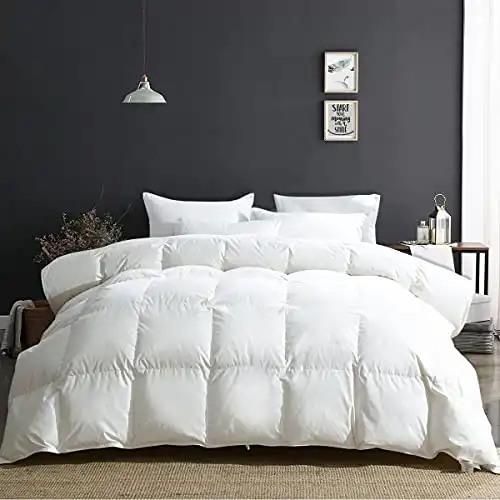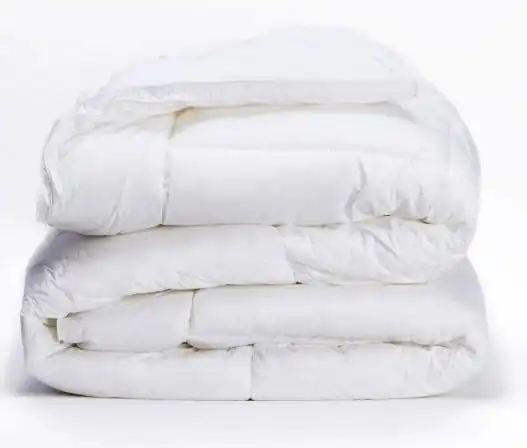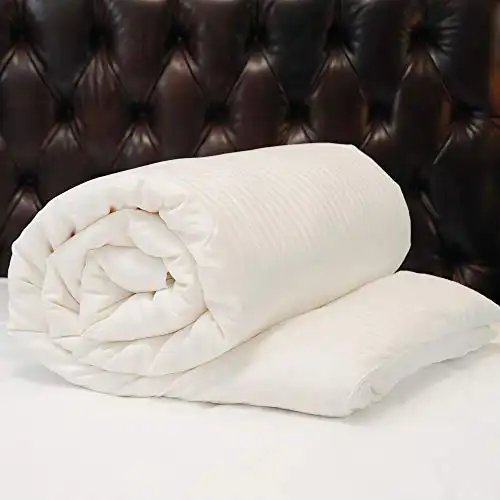- You are here:
- Home »
- Organic Bedding »
- The Best Natural Duvets for Winter
Embrace Cozy Comfort: The Best Natural Duvets for Winter
As an Amazon Associate I earn from qualifying purchases.
As winter’s chill descends and the need for warmth and comfort becomes paramount, there’s no better investment than a natural duvet to keep you cozy during those frosty nights. The choice of a duvet plays a pivotal role in ensuring a good night’s sleep, particularly when it comes to the winter season.
In this comprehensive guide, we will delve into the world of natural duvets, exploring their benefits, discussing specific products, and evaluating the pros and cons of each type.
The Best Warm and Natural Duvets
When it comes to selecting the best natural duvet for the winter season, it’s essential to understand the unique qualities of each type. Below, we explore three main categories of natural duvets, providing brief descriptions, and outlining the pros and cons of each:
Down and Feather Duvets:
Down and feather duvets are filled with soft, insulating feathers, typically from geese or ducks. These natural fillings provide exceptional warmth while maintaining a lightweight feel.
Pros:
- Exceptional Insulation: Down and feather duvets offer unparalleled insulation, creating a cocoon of warmth for a restful night’s sleep.
- Lightweight Comfort: Despite their warmth, these duvets feel light, providing a cloud-like sleep experience.
- Longevity: High-quality down and feather duvets are built to last, making them an excellent investment in winter comfort.
Cons:
- Allergen Concerns: Some individuals may experience allergies due to down or feather fillings, but hypoallergenic options are available.
- Maintenance: Regular fluffing and shaking are required to maintain their loft and ensure even warmth distribution.
|
$119.00
|
$215
|
$398
|
Wool Duvets:
Wool duvets are filled with natural sheep’s wool, known for their outstanding temperature-regulating properties. These duvets excel in moisture-wicking and provide a cozy sleep experience. Let’s take a closer look at the pros and cons of wool duvet inserts:
Pros:
- Natural Temperature Regulation: Wool duvets adapt to your body’s temperature, ensuring comfort in both winter and summer.
- Moisture-Wicking: Wool can absorb moisture without feeling damp, keeping you dry and snug.
- Hypoallergenic: Wool duvets are naturally hypoallergenic, making them an ideal choice for allergy sufferers.
Cons:
- Heaviness: Wool duvets can feel heavier compared to down, which may not suit everyone’s preference.
- Price: High-quality wool duvets can be relatively expensive, though they offer excellent value for performance.
- Noise: The rustling sound of wool may be a concern for light sleepers.
|
$479
|
$318.99
|
$399
|
Silk Duvets:
Silk duvets are synonymous with luxury, filled with long-strand Mulberry silk. They offer a soft, lightweight, and opulent sleep experience.
Pros:
- Luxurious Softness: Silk duvets provide a touch of luxury with their soft and lightweight feel.
- Hypoallergenic: Silk is naturally resistant to dust mites and allergens, making it suitable for allergy-prone individuals.
- Breathability: Silk duvets offer excellent breathability, preventing overheating during the night.
Cons:
- Price: Silk duvets are often more expensive, reflecting the luxurious quality of the material.
- Less Insulation: They may not provide the same level of insulation as down or wool, making them better suited for those who prefer a lighter covering.
|
$139.90
|
$145.98
|
$212.00
|
Each of these natural duvet options offers distinct advantages and considerations. The choice ultimately depends on your preferences, sensitivities, and budget. Selecting the right natural duvet ensures a warm, comfortable, and restful night’s sleep during the winter season.
Why Choose a Natural Duvet over a Synthetic One?
While synthetic duvets may seem like a more affordable and convenient option, there are several reasons why natural duvets are a better choice, especially for winter. Here’s why:
- Superior Insulation: Natural duvet fillings, such as down, wool, and silk, offer exceptional insulation compared to synthetic materials. This means you’ll stay warmer during those cold winter nights without having to pile on extra blankets.
- Breathability: Natural duvets are more breathable than synthetic ones, allowing for better air circulation and temperature regulation while you sleep. This is particularly important during the winter season when we tend to overheat under heavy covers.
- Sustainable Choice: Natural duvets are made from renewable and biodegradable materials, making them a more environmentally friendly option compared to synthetic duvets.
- Longevity: Natural duvets are built to last, often outlasting their synthetic counterparts. This makes them a better investment in the long run, both financially and for your sleep quality.
|
$119.00
|
$318.99
|
$139.90
|
How to Choose the Right Natural Winter Duvet?
When selecting the perfect natural winter duvet for your needs, there are several factors to consider:
- Fill Power: This refers to the volume of down or feathers within a duvet, with higher fill power indicating better insulation. For wool and silk duvets, look for a higher weight per square meter. For winter, opt for a fill power of 600 and above for down and feather duvets.
- Tog Rating: This measures the warmth of a duvet, with higher tog ratings representing warmer duvets. For winter, aim for a tog rating between 10.5 and 15.
- Material: Consider which natural material best suits your needs and preferences. For example, down is known for its insulation, while wool excels in temperature regulation. Whenever possible, choose GOTS-certified duvets to ensure ethical and sustainable sourcing.
- Duvet Construction: The construction of a duvet can affect its warmth and comfort. Baffle-box construction, where the filling is contained within individual pockets, provides better insulation and prevents clumping.
- Allergies: If you have allergies, consider hypoallergenic options or duvets made from materials that are naturally resistant to allergens.
- Budget: Natural duvets can vary significantly in price, so consider your budget when making a selection. Remember, a high-quality duvet is an investment in your comfort.

How to Stay Warm on Winter Nights?
Even with the coziest natural duvet, staying warm on winter nights requires a bit more effort. Here are some practical tips to enhance your sleep experience:
- Layer Your Bedding: Add extra layers like organic blankets and throws for additional warmth. Be sure to use only natural fabrics to maintain breathability and comfort.
- Choose the Right Pajamas: Opt for cotton or silk pajamas, which are breathable and comfortable. Avoid synthetic fabrics that can make you sweat and feel uncomfortable.
- Use a Space Heater: If your room is particularly chilly, consider using a space heater to warm up your bedroom before bedtime. Just be sure to set it on a timer or turn it off before you fall asleep for safety reasons.
- Enjoy a Warm Beverage: Sipping on a cup of herbal tea or hot cocoa before bed can help increase your body temperature and promote relaxation for a restful night’s sleep.
- Electric Blankets: Consider using an electric blanket to keep your bed toasty. Just be sure to follow safety guidelines and turn it off before falling asleep.
- Insulate Your Bedroom: Seal any drafts and use heavy curtains to keep the cold out. This will also help maintain warmth and reduce energy costs.
- Warm Footwear: Wear warm socks or invest in a pair of heated slippers. Keeping your feet warm can help regulate your body temperature and promote better sleep.
- Hot Water Bottle: Place a hot water bottle at your feet for localized warmth. Just be sure to use a cover or towel to avoid direct contact with your skin.
|
$119.00
|
$318.99
|
$139.90
|
Conclusion
As winter approaches, selecting the perfect natural duvet is essential for enjoying a warm, cozy, and restful night’s sleep. Each type of natural duvet, whether filled with down, feather, wool, or silk, offers distinct advantages and disadvantages.
When shopping for a natural duvet, carefully consider your preferences, sensitivities, and budget. The right choice will ensure that you stay warm and comfortable, allowing you to sleep soundly throughout the winter season.
Remember, avoiding synthetic fabrics is crucial for achieving the highest level of comfort and an eco-friendly sleep experience. By following the tips on how to stay warm on winter nights, you can further enhance your sleep quality and ensure a cozy night’s sleep.
Read More: Best Duvets for Summer
About the Author Kamila Flieger
My name is Kamila, and I'm passionate about researching non-toxic, organic products for the home. I believe it's so important to create a safe and healthy environment for our families, and I enjoy helping others do the same.










